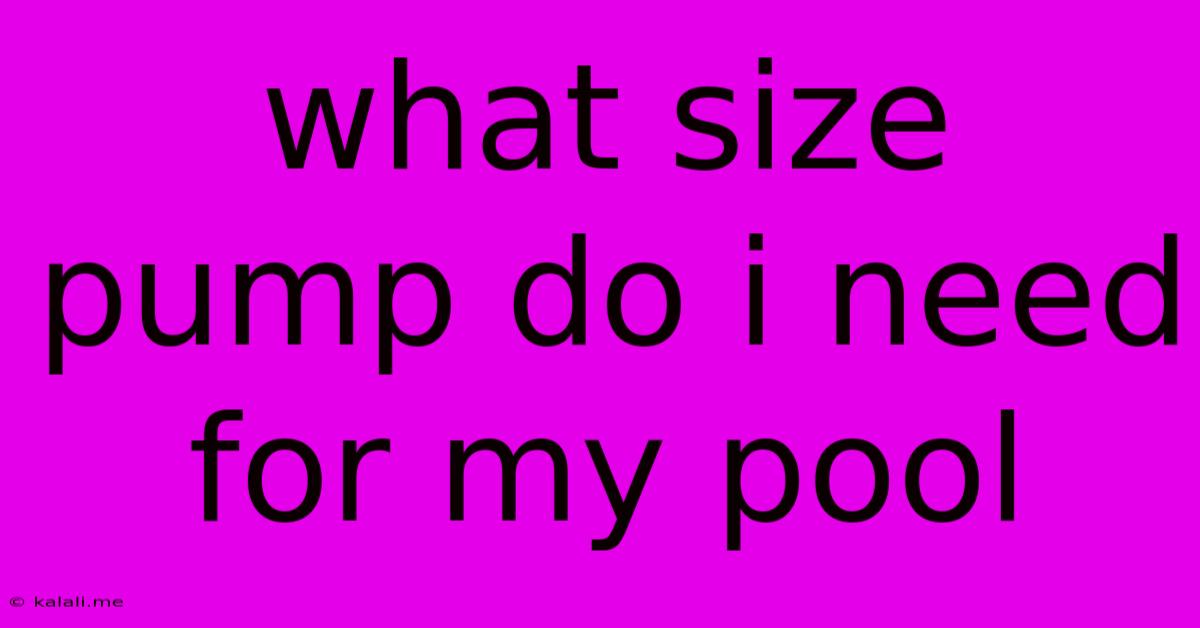What Size Pump Do I Need For My Pool
Kalali
Jun 09, 2025 · 3 min read

Table of Contents
What Size Pool Pump Do I Need? A Comprehensive Guide
Choosing the right pool pump is crucial for maintaining a clean, healthy, and enjoyable swimming experience. A pump that's too small will struggle to keep your pool clean, while one that's too large will be unnecessarily expensive to run. This guide will help you determine the appropriate pump size for your pool, considering key factors to ensure optimal performance and energy efficiency.
Determining the right pool pump size involves several key factors:
-
Pool Volume: This is the most crucial factor. You need a pump powerful enough to circulate the entire volume of your pool within a reasonable timeframe (ideally, every 6-8 hours). You can calculate your pool's volume using online calculators readily available; simply input the dimensions of your pool (length, width, and average depth). Knowing this volume will give you a baseline for pump capacity.
-
Pool Type: Different pool types have varying filtration needs. For example, in-ground pools usually require more powerful pumps compared to above-ground pools due to their larger size and increased water volume. The type of pool surface (concrete, fiberglass, vinyl) can also slightly influence filtration requirements.
-
Filtration System: Your pump works in conjunction with your filter. The filter's size and type will influence the pump's required flow rate. A larger filter generally requires a more powerful pump to ensure adequate water flow through the entire system. Understanding your filter's specifications (gallons per minute or GPM) is crucial.
-
Desired Turnover Rate: This refers to how often the entire pool volume is circulated and filtered. A turnover rate of 6-8 hours is generally recommended for maintaining optimal water quality. A faster turnover rate might be preferable in hotter climates or pools with higher bather loads.
-
Pump Horsepower (HP): Horsepower is a measure of the pump's power. Higher horsepower generally means a more powerful pump, capable of handling larger pool volumes and faster turnover rates. However, remember that a larger HP pump also means higher energy consumption and running costs.
-
Flow Rate (GPM): This indicates the volume of water the pump circulates per minute. A higher GPM is generally needed for larger pools, faster turnover rates, and more efficient filtration.
How to Calculate Your Pool Pump Size:
There's no single formula to determine the perfect pump size. It's a combination of factors, and considering professional advice is always recommended. However, a good starting point involves calculating your pool's volume and then aiming for a turnover rate of approximately 6-8 hours. For example, if your pool has a volume of 20,000 gallons and you desire an 8-hour turnover, you would need a pump capable of moving approximately 2500 gallons per hour (20,000 gallons / 8 hours).
Choosing the Right Pump Type:
Beyond sizing, consider the different pump types available:
-
Single-speed pumps: These are the most basic and least expensive but consume the most energy.
-
Two-speed pumps: Offer flexibility with varying flow rates, allowing you to adjust the pump speed based on your needs.
-
Variable-speed pumps: Provide the greatest energy efficiency and control, adjusting the pump speed automatically based on pre-set parameters.
Energy Efficiency and Cost Considerations:
Variable-speed pumps, while initially more expensive, often offer significant long-term cost savings due to reduced energy consumption. Investing in an energy-efficient pump will not only reduce your utility bills but also contribute to environmental sustainability.
Remember to consult with a pool professional for personalized advice and recommendations based on your specific pool and its unique requirements. They can help you choose the right size pump and ensure optimal performance for years to come. Don't hesitate to ask questions and seek multiple opinions to make an informed decision.
Latest Posts
Latest Posts
-
Is It Legal To Tie Two Breakers Together
Jun 09, 2025
-
Java Lang Null Pointer Exception Minecraft
Jun 09, 2025
-
Best Way To Ping Device Every Few Seconds
Jun 09, 2025
-
Installing A Water Line To Fridge
Jun 09, 2025
-
What Happens If A Body Is Parallel For Too Long
Jun 09, 2025
Related Post
Thank you for visiting our website which covers about What Size Pump Do I Need For My Pool . We hope the information provided has been useful to you. Feel free to contact us if you have any questions or need further assistance. See you next time and don't miss to bookmark.